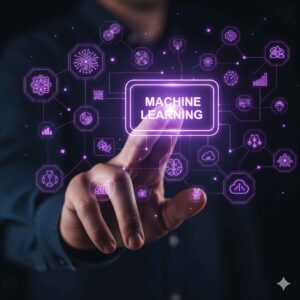Description
Course Description
This 16-week industry-oriented certification focuses on how AI is applied to solve real-world problems across sectors such as healthcare, finance, retail, and manufacturing. The course emphasizes practical implementation, deployment, and project-based learning using modern AI tools and frameworks. Learners will gain the ability to design, train, evaluate, and deploy AI models, with a strong focus on ethics, explainability, and business value.
Intended Audience
- Industry professionals and domain experts seeking to apply AI in their fields
- Software engineers, IT professionals, and data engineers aiming to integrate AI solutions into workflows
- Product managers and business leaders who need AI literacy to manage AI-driven initiatives
- Students and early-career professionals who have prior exposure to ML and want to upskill in applied AI
Prerequisite Knowledge
- Basic knowledge of Python programming
- Familiarity with core ML concepts (supervised/unsupervised learning)
- No prior deep learning or deployment experience required
Course Highlights
- Focus on 70% hands-on, 30% theory
- Application-driven case studies across multiple industries
- Training in modern AI frameworks: TensorFlow, PyTorch, Hugging Face, OpenCV, MLflow, Docker
- Dedicated module on AI ethics, fairness, and explainability
- End-to-end Capstone Project involving deployment of an AI solution
Topics
- AI adoption across industries
- Case studies: healthcare, finance, retail, manufacturing
- Python refresher for AI workflows
- Introduction to Jupyter/Colab and project environment setup
Learning Outcomes
- Understand the scope and impact of AI in different domains
- Recognize key opportunities and limitations of AI adoption
- Set up a practical environment for applied AI projects
Labs / Hands-on
- Explore case studies and map AI opportunities in a chosen domain
- Set up Python environment, install essential AI libraries
Assessment
- Short quiz on AI in industry
- Submission: “AI Use Case Mapping” exercise for learner’s domain of choice
Module 2: Data for AI (Week 3–4)
Topics
- Data collection, cleaning, preprocessing
- Feature engineering for industry problems
- Data pipelines and automation (intro to PySpark, Airflow basics)
Learning Outcomes
- Prepare raw data for AI model training
- Build scalable pipelines for large datasets
- Automate preprocessing for repeatability
Labs / Hands-on
- Clean and preprocess a retail/finance dataset
- Build a mini data pipeline with PySpark
Assessment
- Mini Project 1: End-to-end data pipeline for an industry dataset
Topics
- Supervised learning (classification, regression) in industry use cases
- Unsupervised learning: clustering, anomaly detection, customer segmentation
- Business metrics vs ML metrics (precision/recall vs ROI, cost impact)
Learning Outcomes
- Apply ML to solve practical business problems
- Evaluate models with both technical and business KPIs
- Communicate AI results in business-relevant terms
Labs / Hands-on
- Fraud detection model (classification)
- Customer segmentation project using clustering
- Compare ML models with cost-sensitive metrics
Assessment
- Mini Project 2: End-to-end ML solution for a finance/retail dataset
Module 4: Deep Learning & Advanced AI (Week 9–12)
Topics
- Neural networks in practice: CNNs, RNNs, transfer learning
- Transformers and pre-trained models (BERT, ResNet)
- Applications: computer vision (OCR, defect detection), NLP (chatbots, summarization), recommendation systems
Learning Outcomes
- Train and fine-tune DL models for real-world tasks
- Apply transfer learning to domain-specific problems
- Implement applied NLP and computer vision solutions
Labs / Hands-on
- Image classification using CNNs
- Sentiment analysis with BERT
- OCR + summarization workflow for invoices
Assessment
- Mini Project 3: Applied deep learning prototype (vision or NLP)
Topics
- Responsible AI: fairness, bias, explainability
- AI model deployment: APIs, containers, CI/CD
- Monitoring, retraining, and lifecycle management (MLOps basics)
Learning Outcomes
- Identify and mitigate bias in AI models
- Deploy AI models into production-like environments
- Monitor and manage deployed models
Labs / Hands-on
- Bias detection on credit scoring dataset (using SHAP/LIME)
- Deploy a fraud detection model using Docker + FastAPI
- Track experiments with MLflow
Assessment
- Practical deployment exercise: containerize and deploy a trained ML model
Module 6: Capstone Project (Week 15–16)
Topics
- Problem scoping and dataset selection
- Model building, evaluation, deployment
- Documentation and presentation
Learning Outcomes
- Execute an end-to-end AI project with real-world complexity
- Demonstrate deployment readiness and ethical considerations
- Communicate AI project outcomes to technical and non-technical audiences
Labs / Hands-on
- Full-cycle project implementation (choose domain: healthcare, finance, retail, manufacturing)
Assessment
- Capstone Project submission and presentation: deployed AI product prototype with report




